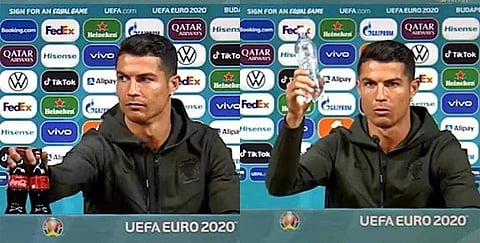

More than his silky-smooth two goals against Hungary a few days ago, it was Cristiano Ronaldo’s marketing kick, the removal of the two Coke bottles before the start of his press conference, that has caught people’s attention. ‘Agua’, he shouted, pointing to a bottle of water as his preferred choice over disgusting, fizzy drinks.
A day after Ronaldo’s public show of disdain for Coke, French striker Paul Pogba took exception to a bottle of Heineken being placed in front of him after being named man of the match in France’s 1-0 win against Germany. The beer was Heineken’s alcohol-free 0.0 brand. Pogba is a Muslim and it is not known whether the product and event managers had been sensitized that-zero-alcohol or not-Heineken is after all an alcohol brand, and it should not have been there.
When a brand like Coke or Heineken pays maybe $50-60 million to be one of the sponsors of the hugely popular Euro2020 Football Championships-10 sponsors for Euro2016 collectively paid $575 million-one would expect the minutest details worked out. It is therefore marketing failure (bigtime) to not understand the sensitivities of these super stars, themselves big brands, before trying to ride on their shoulders.
Sensitive branding
The football stars are not endorsing Coke or Heineken; the products are on display via the sponsorship contracts for the tournament. Ronaldo or Pogba have no personal stake. If that is the case, the advertisers should have done their homework about the preferences and inclinations of the football players. Cristiano Ronaldo, a superbly fit health fiend at 36, is known to be against carbonated drinks and has said as much in interviews when deriding his small son’s addiction to Coke and Fanta. Someone should have taken care to see that the coke bottles were not staring at him from the table he sat down on; Coke could have an been an image on the backdrop behind, and Ronaldo could have done nothing about it.
UEFA is now scrambling around reminding team officials that their players should respect sponsors’ advertising, since that is what part-finances the $2.5 billion European soccer tournament. But what happens when players have conscience objections?
South African cricketer Hashim Amla refused to sport a Castle Rock beer logo on his jersey for religious reasons; other Pakistani cricketers too have had the same problem. Endorsement contracts, as it is complex, are going to get more mind-boggling.
What do these faux paus cost the advertiser? Ronaldo’s snub cost Coke a share price drop from $56.10 to $55.22 almost immediately, a 1.6 per cent dip that pushed down its market value from $242bn to $238 billion-a drop of $4 billion. When investing billions on celebs to push a brand, the advertiser must do his research about his ‘human’ brand too. Going for a quick-fix can only rebound.
Sample this: English football star David Beckham was signed on for a $6 million, four-year contract to promote the hair product Brylcreem. Halfway through the agreement Beckham decided to shave his head, making it difficult for the hairstyling cream to connect with the star. Brylcreem continued with Beckham, but consumers punished both brands, and sales of Bryclream dropped 25 per ent soon after the shaved head popped up.
Long-term impact
Will a Coke or a Heineken recover from such hugely negative publicity? There is not a shadow of doubt they will. People have short memories and for every young consumer, who is impressed by Ronaldo’s health message, there are five new suckers to take his place. At worst, it will be an embarrassment these brands will have to endure through the UEFA tournament.
Coke has survived worse. In 2004, the world was in shock when it became known that farmers in Andhra Pradesh and elsewhere were using these carbonated, syrupy drinks as pesticides and spraying them on plants. The sugar spray attracted ants on to the plants, which in turn ate the pests’ larvae. From a marketing point of view it was a disaster for Coke, but it survived.
On the other hand, the debate and dust that Ronaldo has kicked up will make the world richer in health consciousness. A single bottle of the fizzy drink has 10 teaspoons of added sugar. The World Health Organization (WHO) recommends consuming not more than 6 teaspoons of added sugar daily. Dieticians also point out that blood sugar levels shoot up within 20 minutes of drinking Coke, causing a burst of insulin. The liver then turns the high amounts of sugar circulating the body into fat.
Caroline Cerny of the Obesity Health Alliance, a coalition of more than 40 major health organizations, said: “Ronaldo’s defiant stance against being associated with a sugary drink could mark a turning point and we hope other sports stars will similarly refuse to be used as walking adverts for junk food and other unhealthy products.”More power to celeb sportsmen to become carriers of sensible health messages.
ALSO WATCH |